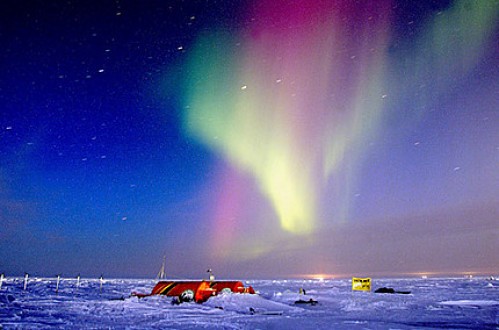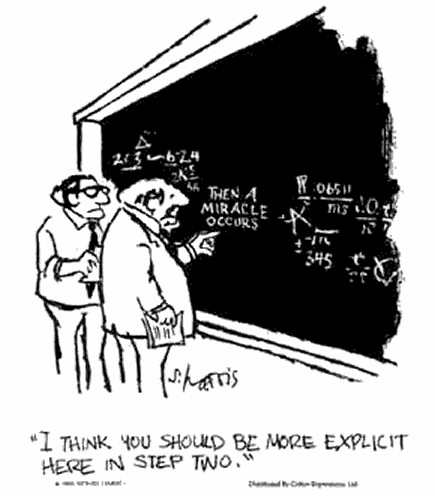
A friend of mine recently asked me to talk to her teenager about believing in G-d while also believing in science and logic. He's trying to figure things out for himself and she thought a few role models of intelligent, educated people who worship the glory of the Universe, whether they personalise it into a G-d or not, might be a good thing to have.
I was honoured that she asked me, of course, but now I have to figure out what to say. It's always difficult to articulate such things, but I will give it a try.
I have a complicated relationship with the Management, given that whoever is in charge of the Universe doesn't seem to do the best job sometimes. At least, that's how it looks from our perspective when a child or a young parent dies for no reason that anybody can fathom. A lot of people conclude at that point that there is, in fact, no reason and no Management and the Universe is completely random and probably hostile. That was my mother's opinion and she had some basis for it in her life, maybe.
My life has been very different. I've made mistakes, of course, some quite bad ones that I hope my children will not duplicate - it's up to them to make their own mistakes, after all. But I have definitely had times in my life that I knew I was being pushed in a certain direction, that things were falling into place like puzzle pieces and I was being steered. There is no logical explanation for that feeling, for the inevitability of certain actions and choices. Maybe my brain was playing tricks on me, or maybe it was real. I don't know. Flylady calls it a G-d breeze, the Midnight Editor filling her sails. Julia Cameron calls it the Life Force. At the very least, the universality of the experience tells me that it is a powerful effect, regardless of its origin.
I do believe that science can and should be the way to find out how the Universe functions. There should not be any leaps of faith in explaining the movement of planets, the migration of animals, even the weird and wonderful world of subatomic particles where causality and other cherished notions seem to go by the board. It still can all be captured in the math, and not quite as described below.

(Copyright Sidney Harris, 2006).
I don't believe in the G-d of the gaps. That G-d gets smaller and smaller and more irrelevant as we understand more and more about the miracles of Creation. Newton thought that the orbits of the planets would be unstable without G-d to keep them where they belonged. Now we know there is a much greater miracle - those orbits work very nicely all by themselves, without any fine-tuning. I don't see a need for so-called Intelligent Design. I don't know whether there was a Creator or just a blind explosion behind the Big Bang. I think that people who spend their precious brain cycles trying to reconcile the literal words of Genesis with the latest scientific ideas about the early universe are missing the point. Our appreciation of the miracle of Creation does not depend on a literal interpretation of a set of stories. As the great mathematician and astronomer Laplace is alleged to have said, we have no need for the G-d hypothesis to explain the how.
Don't get me wrong. The stories are beautiful and thought-provoking, regardless of how well they happen to fit with current scientific thought. I believe that the Torah (can't speak for the books of other faiths) is a blueprint for a good life, and that it is good for me to follow it whether Moses literally wrote it down or not. I believe that something happened at Sinai, even if I don't know whether G-d spoke to the people from the mountain or they just imagined it. As Einstein said, imagination is more important than knowledge. That imagination has come down to us through the generations to lead us into a life that has meaning beyond the mundane.
Is the aurora art? Does the fact that I believe it is caused by charged particles striking the upper atmosphere make it less beautiful and inspiring to look at? Why do I find it inspiring? That, I believe, is where a belief in something larger than yourself (whatever you want to call it) enlarges your soul. You can believe it is concerned with your affairs and you can talk to it; or you can consider it some kind of abstract, indifferent universal force. It doesn't matter. What does matter, to me, is that people think and imagine beyond their everyday affairs, to the beauty that lies beyond.
What do you think?

That's very nice. I actually think that belief in God is a personality characteristic - like being extroverted or introverted -- its a predisposition you are born with, that can be modulated by life experiences. Some people never have a doubt that there is a God, whereas to others it is obvious that there isn't one. I agree with you that it's orthogonal to appreciating the amazingness of the existence of everything, or even of one thing. The ability to sense the wonder, and to have it NOT be dependent on ignorance (what you called the God of the gaps) is somethink that can be nurtured in people -- I think all children have it to begin with, but some are laughed or embarrassed out of it -- and that is a crime, I believe. The ability to be comforted by a flower is a gift. But I dont think it's art -- its REALITY -- that is one of the things that make the aurora so amazing -- its REAL - its not an artifact that people made. Art is made by people, reality is made by God, or the anthropic priciple or however you want to call it. And I agree with you that being a scientist is one of the ways to worship God -- to study the amazing universe - its like someone giving you an amazing present -- the best thanks is to appreciate it.. Interesting thoughts.
ReplyDeletean aside -- your writing is really good..